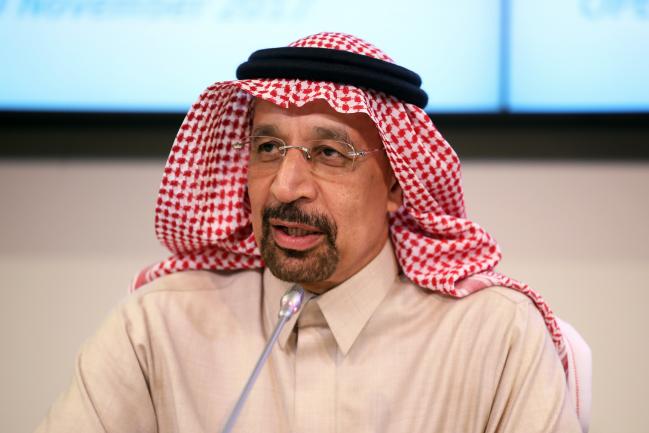(Bloomberg) -- For 45 years, it’s been considered out of bounds for Saudi Arabia. But all of a sudden, Riyadh made what many read as a veiled threat to use the kingdom’s oil wealth as a political weapon -- something unheard of since the 1973 Arab embargo that triggered the first oil crisis.
Saudi Arabia, the world’s biggest oil exporter, said on Sunday it would retaliate against any punitive measures linked to the disappearance of Washington Post columnist Jamal Khashoggi with even “stronger ones." In an implicit reference to the kingdom’s petroleum wealth, the statement noted the Saudi economy “has an influential and vital role in the global economy.”
Roger Diwan, a longstanding OPEC watcher at consultant IHS Markit Ltd., said the Saudi comments broke “an essential oil market taboo.”
While few think that Saudi Arabia is prepared to follow through, even the suggestion of using oil as a weapon undermines Riyadh’s long-standing effort to project itself as a force for economic stability. Jeffrey Currie, the head of commodities research at Goldman Sachs (NYSE:GS) Inc., said Middle East tensions impacting the oil market have now "broadened to include Saudi Arabia."
The anxieties were exacerbated by an opinion piece penned by Turki Al Dakhil, who heads the state-owned Arabiya news network and is close to the Royal Court, in which he openly talked about using oil as a weapon.
“If President Trump was angered by $80 oil, nobody should rule out the price jumping to $100 and $200 a barrel or maybe double that figure,” he wrote.
The Saudi embassy in Washington later said Al Dakhil didn’t represent the official position of the kingdom and Saudi officials, speaking privately, said there wasn’t a change in the long-held policy that oil and politics don’t mix. On Monday, Khalid Al-Falih, the Saudi energy minister, used a speech in India to soothe concerns, pledging his country will continue to be a responsible actor and keep oil markets stable.
"I want to assure markets and petroleum consumers around the world that we want to continue support the growth of the global economy, the prosperity of consumers around the world," Al Falih said.
Yet the fact that the Arabiya article was published only minutes after Saudi Arabia’s press release was issued led many to conclude it was either a message conveyed outside diplomatic channels or a trial balloon that quickly went flat.
Oil rose in early trading, with Brent crude, the global benchmark, rising as much 2 percent to $81.92 a barrel. Prices later pared gained as concerns about global growth hit global equity markets.
Saudi Arabia also said it’s begun an internal investigation into the disappearance Khashoggi at its Istanbul consulate and could hold people accountable if the evidence warrants it, according to a Saudi official.Whatever the Saudi leadership intended with it Sunday statement, it broke with the kingdom’s diplomatic orthodoxy: oil and politics are separate.
For example, during a recent diplomatic spat with Canada, Al-Falih reiterated the kingdom had a "firm and long-standing policy" that petroleum exporters are not mixed with political considerations. Saudi state-owned company Aramco continued to supply a refinery in Canada despite Riyadh severing most other economic links.
While the mere hint of Saudi Arabia using oil as an economic weapon still brings back memories of queues at the pump and stagflation in the Western world, there are good reasons why Saudi Arabia hasn’t wanted to brandish oil-market power as a political tool. Essentially, it has lots in common with another relic of the 1970s: the Cold War doctrine of mutually assured destruction.
True, Riyadh can bring the global economy to its knees in the short-term by cutting output and sending prices sharply up. The kingdom pumps one-in-ten oil barrels produced worldwide, and holds nearly all the spare capacity available to respond to any supply outage. Even just hinting that it won’t replace the barrels lost from Iran due to U.S. sanctions could be enough to push prices toward $100 a barrel.
But if the Saudis retaliate using oil, it would lead to “calamity,” said Stephen Innes, Singapore-based head of Asia Pacific trading at Oanda Corp. “This would be so destabilizing for global markets that it would make the current trade tensions between the U.S. and China look like a game of Axis & Allies.”
Over the medium-term it would lead to massive oil demand destruction and an accelerated race into renewable energy and electric cars. The 1973-74 embargo, and the second oil crisis in 1979, destroyed oil demand for ever as industrialized countries taxed gasoline and diesel and embarked on conservation policies. Oil consumption is lower today than in 1974 in Germany, Japan, France, Italy and the United Kingdom.
